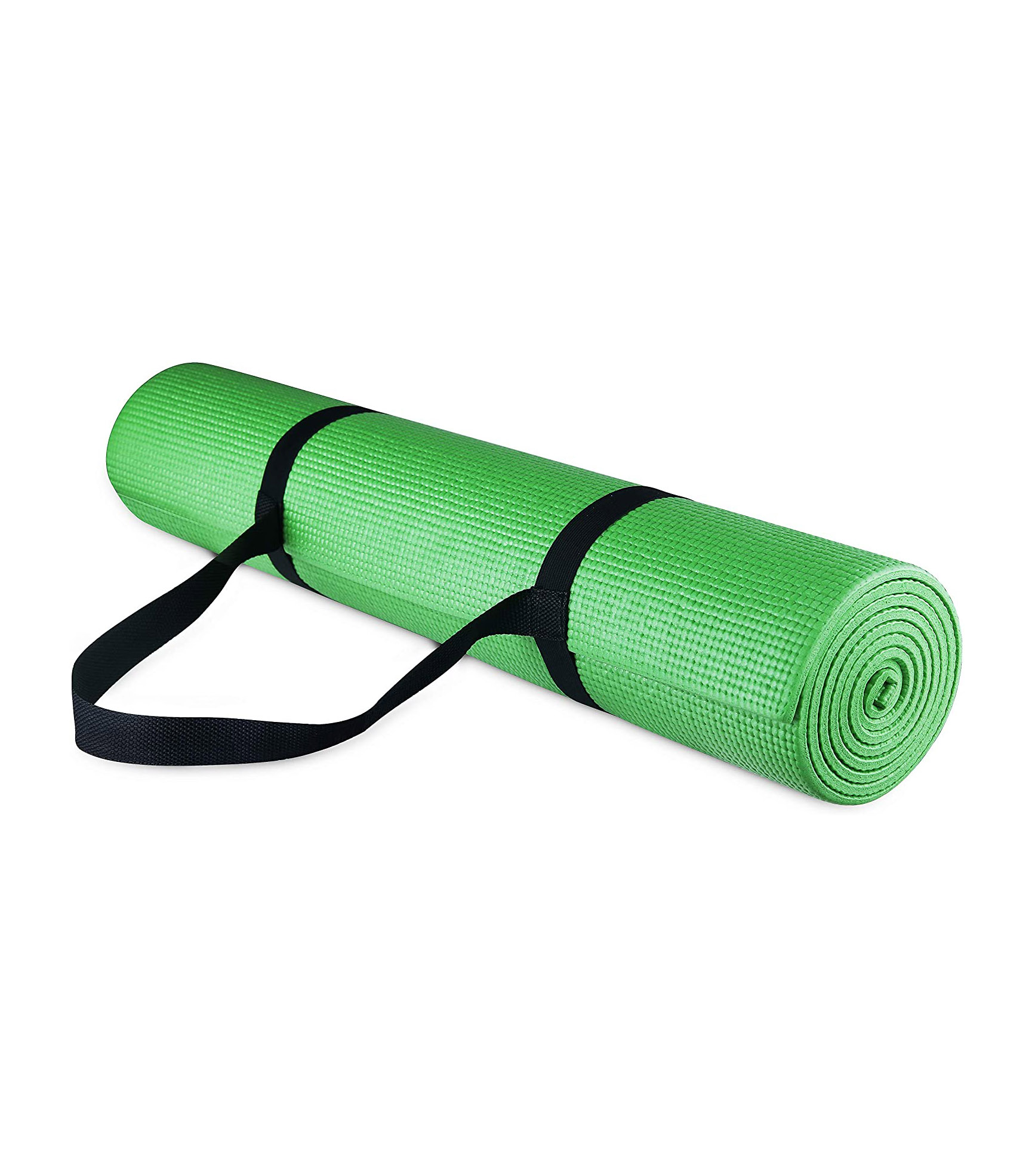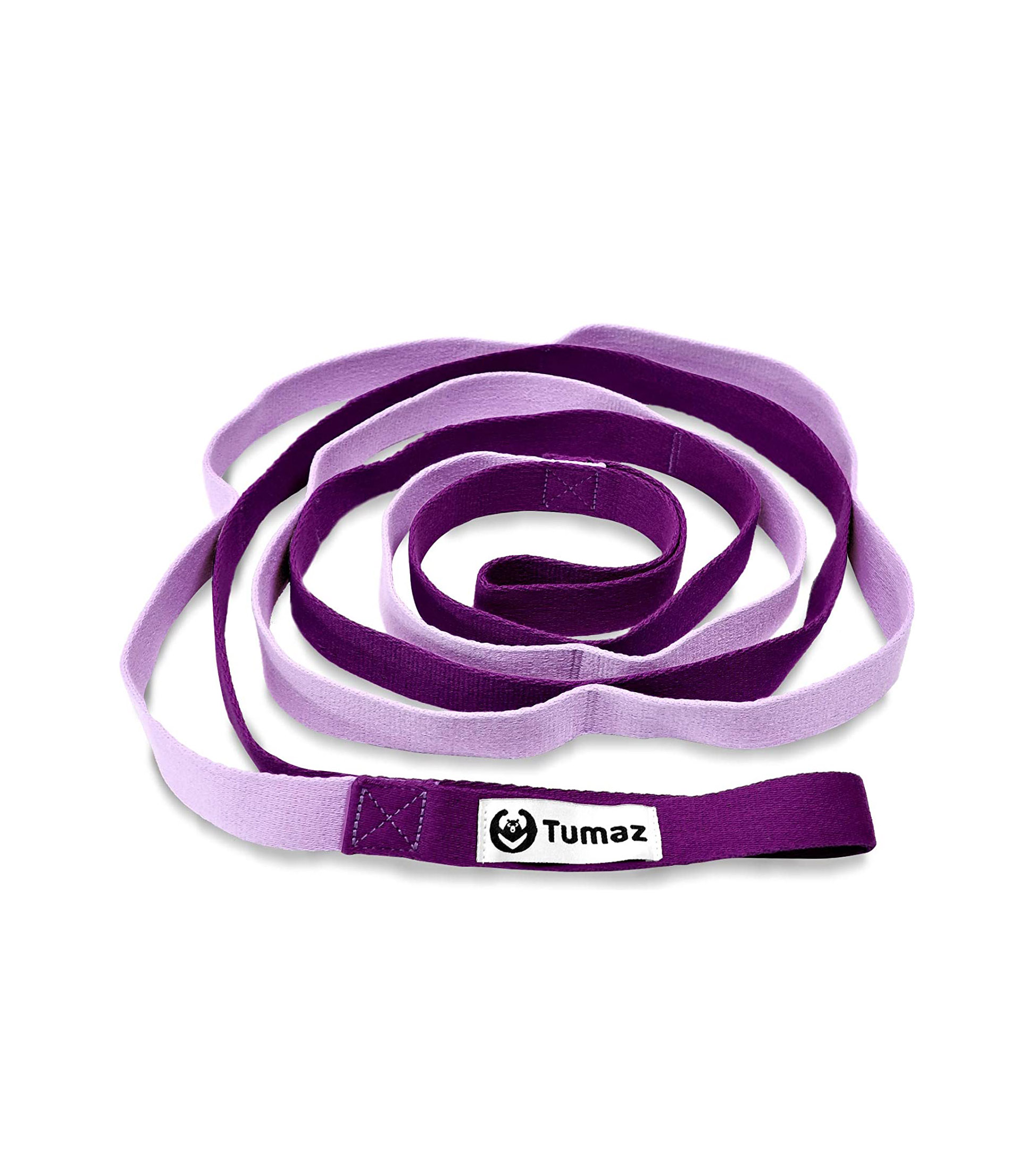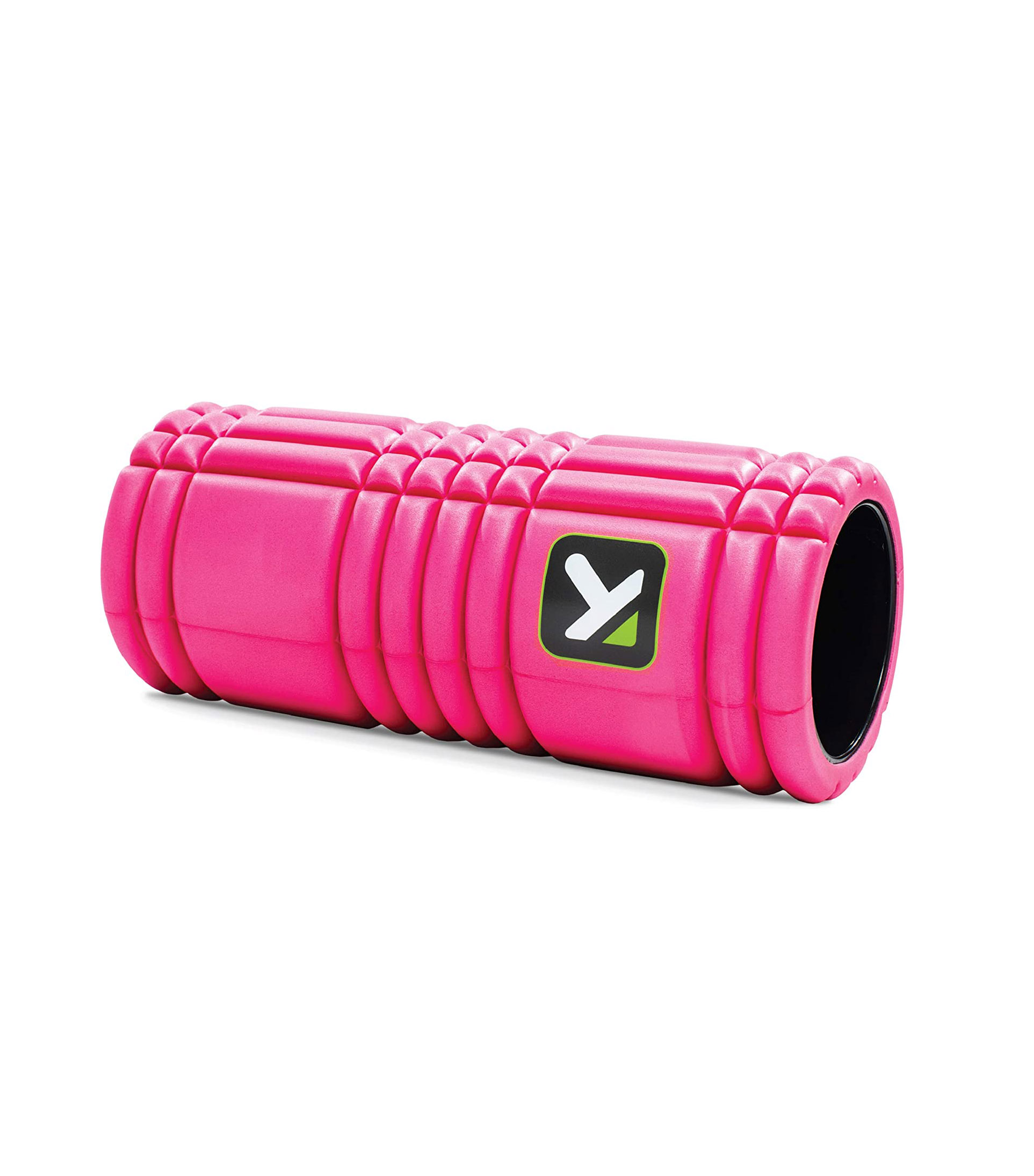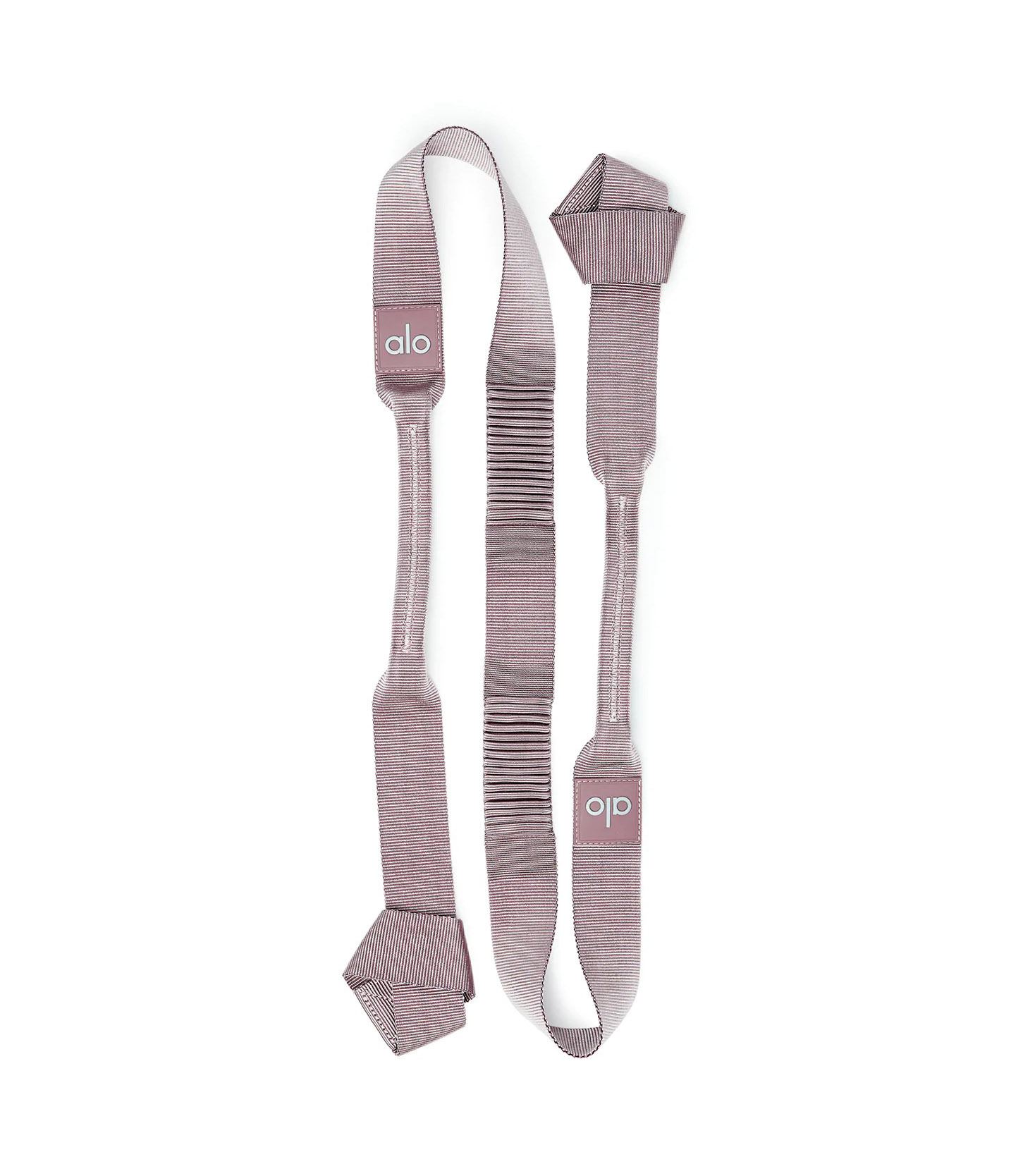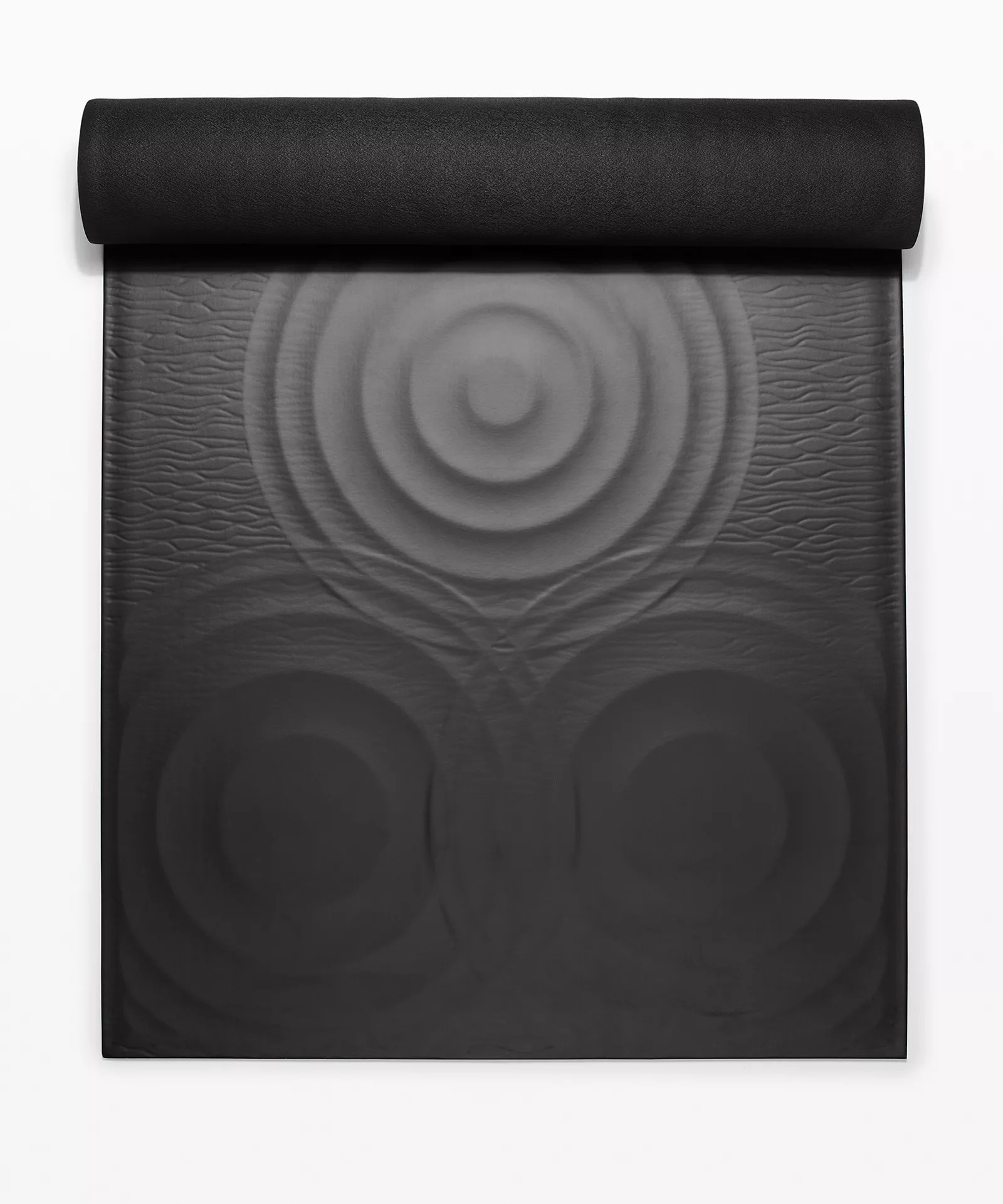Add This 5-Minute Trick to Your Bedtime Routine to Fall Asleep Faster
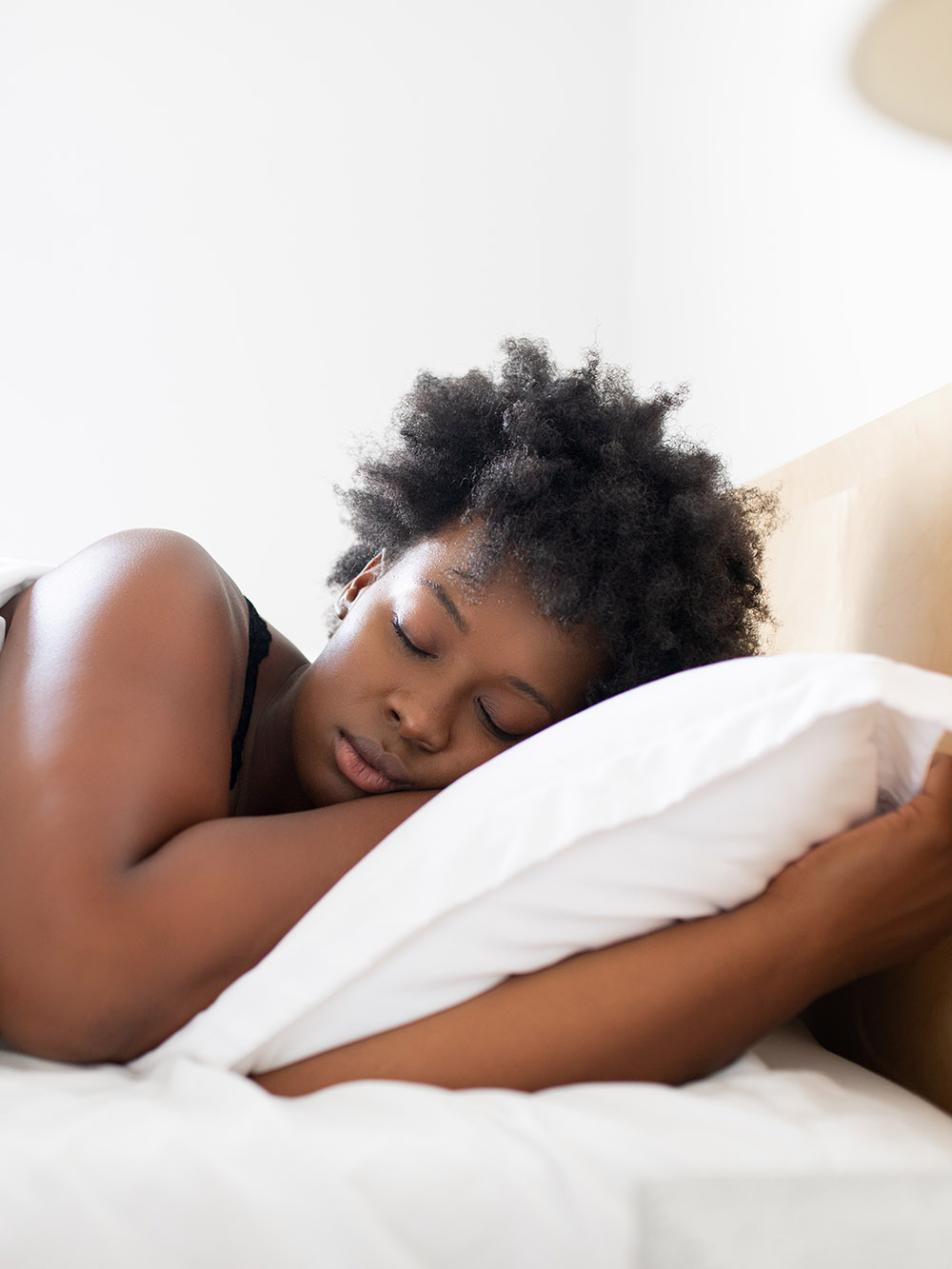
You've probably heard of the things you should do before bed so that you can fall asleep easily. Like creating a bedtime routine that helps you unwind. Or maybe you've read the advice about avoiding screen time. You could have been told to avoid certain foods and prioritize others before bed. And you might have even shopped for new bedding, blackout shades, a white-noise machine, essential oils, pillow sprays, sleep supplements, and more to help in the snooze department.
There are so many things you can do and try in order to get a better night's sleep. Some things might work for you, and others might not. But if you're looking for another "trick," why not try stretching before bed?
It might seem a bit odd to stretch before bed—I mean, you stretch before and after workouts and when you're feeling sore, but before you lie down for hours? It can sound like weird advice. But stretching can actually help you unwind. "Stretching before bed can help your body relax and aid in better sleep," explains Dani Coleman, director of training at P.volve Los Angeles. "When you stretch before bed, it can help promote blood flow to your muscles, flexibility, and help to relieve tension in places we typically overuse throughout our day like our neck and shoulders. Furthermore, stretching with the proper use of your breath can help calm your nervous system and help your mind release stress before sleeping."
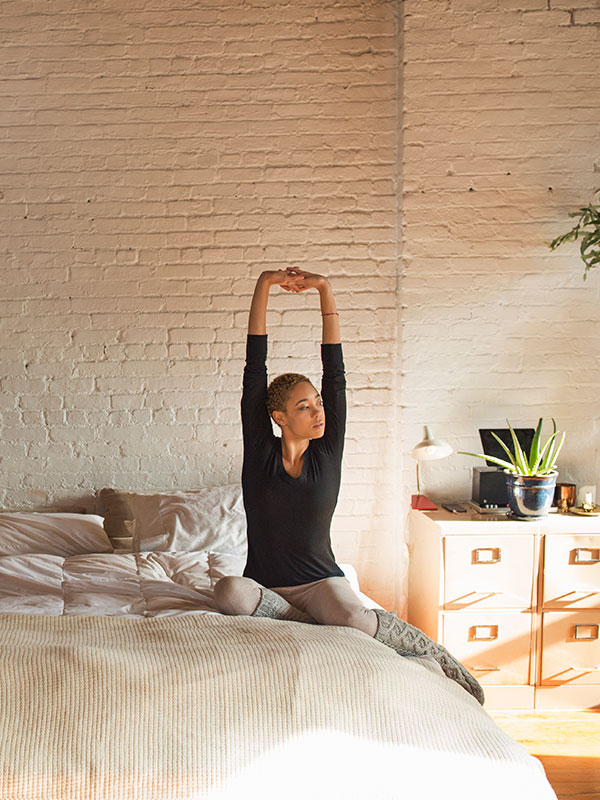
There are different types of stretching, but for your bedtime routine, you should go with static and passive stretching. Calm's Daily Move instructor and movement expert and director of You Got This Girl, Mel Mah, says that this type of stretching won't over-activate the mind and body. "The point is to wind your body down into a relaxed state so you can doze off. When you pair slow breathing with stretches, that further allows the whole body to release stress."
As for when you should stretch and how long you should do it, most of the experts I spoke to for this story say you should aim for 30 minutes before bedtime and anywhere between five to 20 minutes of stretching time. "Integrating just five minutes of restorative movement before bed can help increase mobility, alleviate soreness, and calm the mind and body," Coleman says.
Massage therapist and training and development manager at The Now Massage Matthew Perry recommends standing, sitting, or lying still and holding each stretching position for a period of time—30 seconds to a minute. Afterward, close your eyes and practice some meditative breathing to complete the ritual. Perry also suggests warming up your muscles by taking a warm bath or shower before the ritual. "You can add magnesium bath salts or essential oil. A few pumps of our Now Classic or Hemp Body Oil are great for soothing and softening skin," he says.
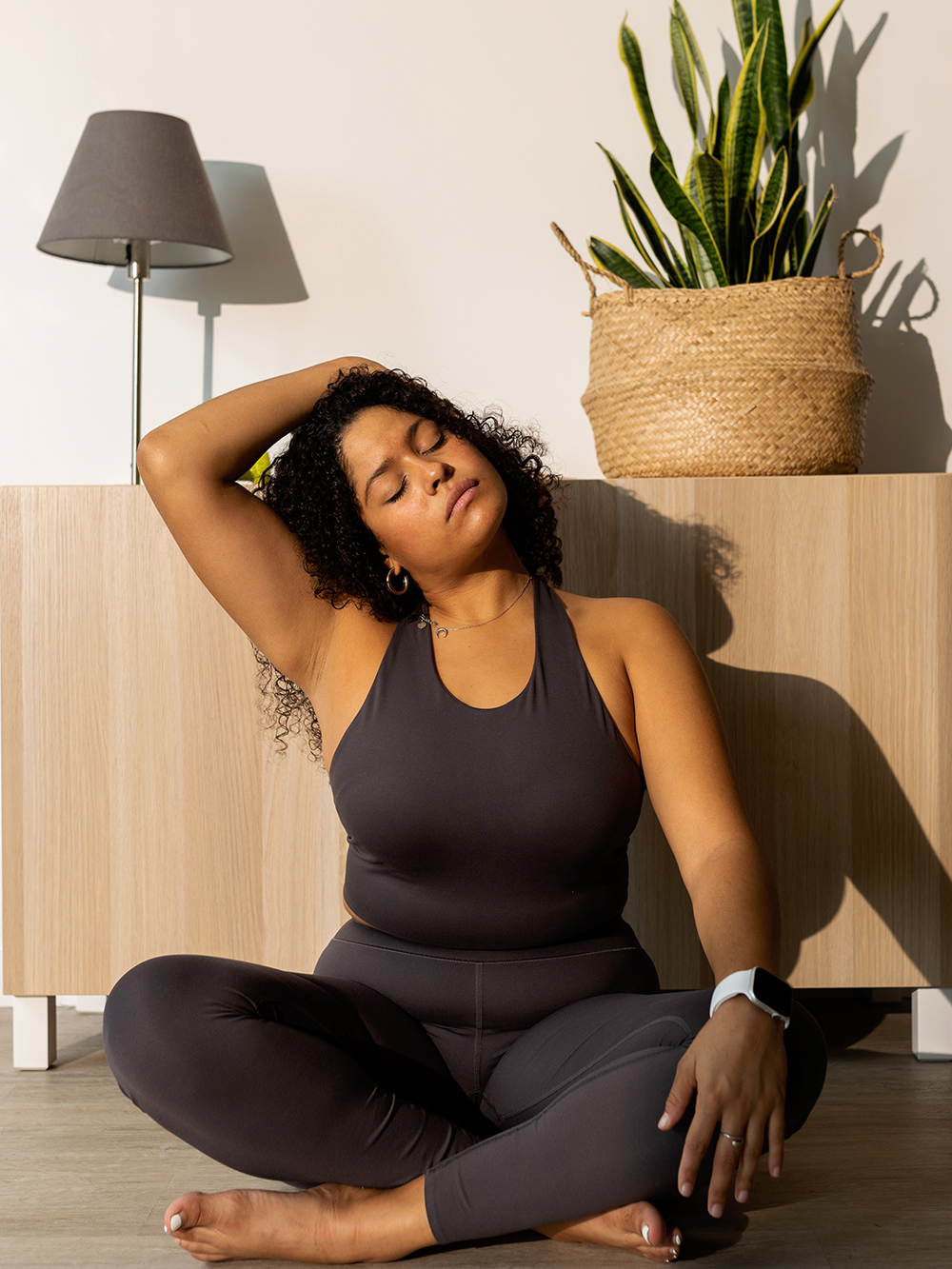
Perry also recommends focusing on your breathing since it enhances relaxation and makes it easier to hold stretches for the appropriate amount of time. And if you feel any pain, stop the movement immediately. "Remember with stretching, you should feel a little bit of tension but should not feel pain," Coleman says. "Make sure before bed especially that you do not overdo it. The point is to get the body into a more relaxed state, not to stress it."
You also want to be careful that your stretching is calming and not quite energizing since you're trying to wind down. "Don't try movements that increase heart rate or exertion before bed, as this will trick your body into wanting to stay awake, the reverse outcome you are looking for," says Austin Martinez, VP of training and experience at StretchLab.
Try these relaxing stretches below.
1. Child's Pose
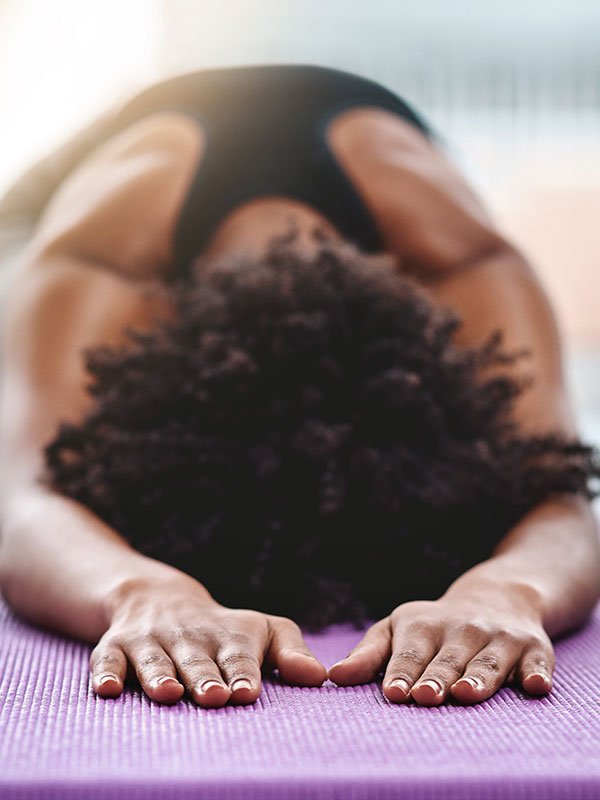
Child's pose can release any tightness you may feel in your body, relieve body tension, and reduce back pains, Perry says. And Coleman adds that it will stretch your lower back, thighs, glutes, ankles, and upper body.
Coleman shares how to do it:
1. Start gently kneeling on your shins, toes untucked, and knees slightly wider than your hips.
2. Gently walk your hands out in front of your body, bow your head, and rest it on the floor. Arms can be outstretched with the palms up or down.
3. Hold this stretch for two minutes and breathe deeply.
2. Cat-Cow
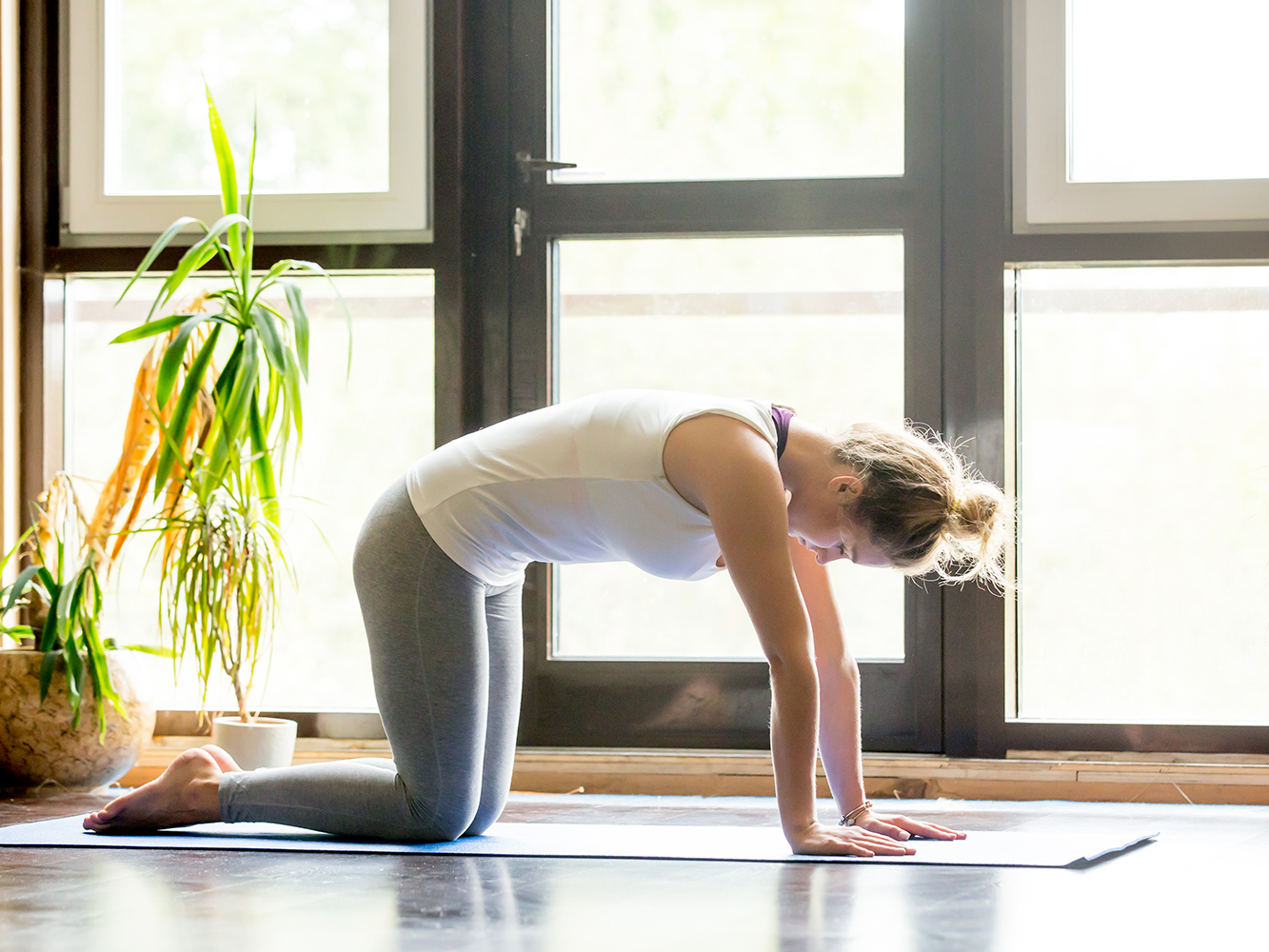
"This helps build flexibility in the neck, back, shoulders, and spine," Coleman says. "It also helps to relieve tension in the neck and upper back. Try 10 to 20 reps."
Coleman shares how to do it:
1. Start quadruped with a neutral spine.
2. Inhale as you look up to the sky and arch your lower back.
3. Exhale as you drop your chin into your chest, pull your abdominals in, and curve your upper back like a cat.
3. Downward Dog
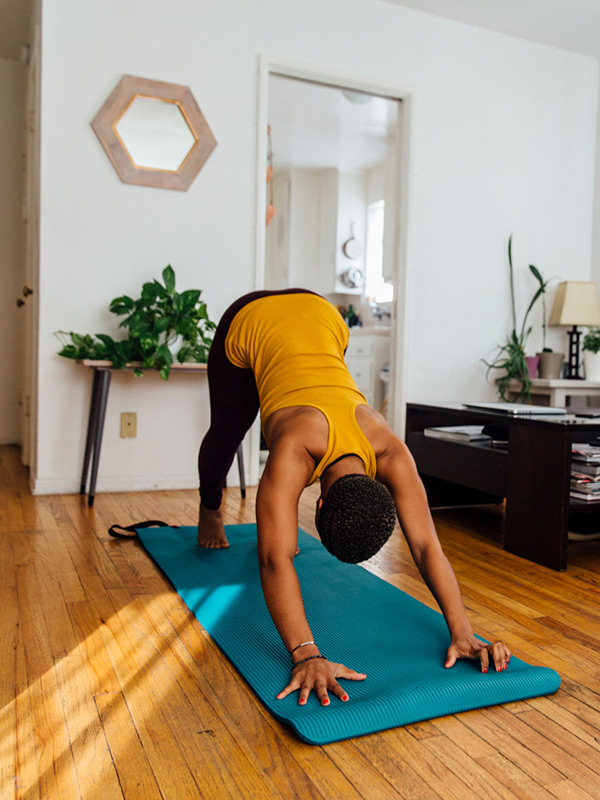
This can stretch your hamstrings, calves, and ankles.
Martinez shares how to do it:
1. With both your hands and feet planted on the floor, rise up, leading with your glutes to make an "A" frame.
2. Lean your weight back into your heels to target your calves.
3. Rise out of the position, pushing your glutes toward the ceiling to target the hamstrings.
4. Neck Circles
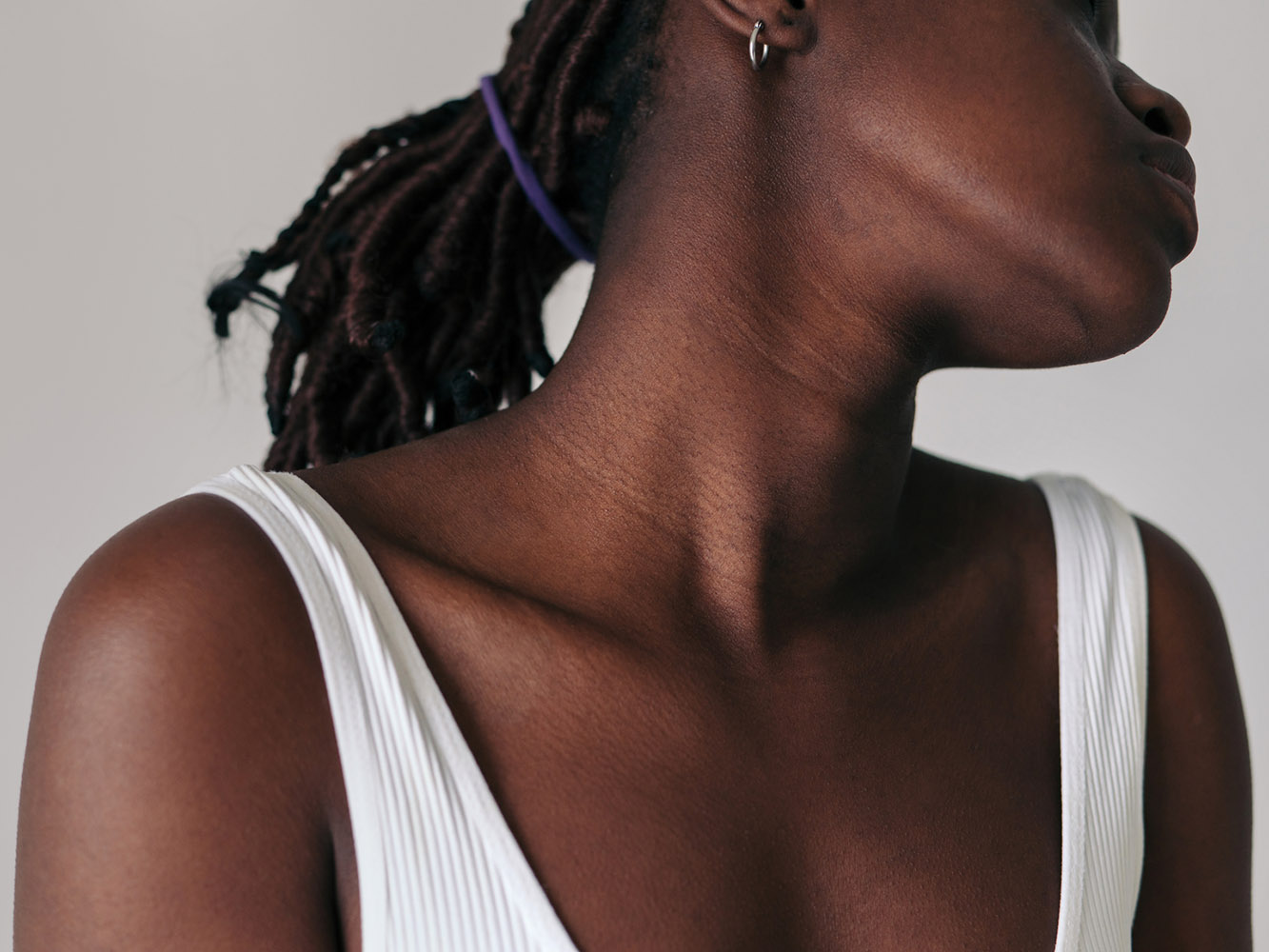
"This will help generate some blood flow into your neck area and allow you to explore where you are holding tension in your neck," Coleman says.
Coleman shares how to do it:
1. Gently drop one ear toward your shoulder and carefully circle your neck in one direction.
2. Repeat eight times on one side at a slow cadence, and then repeat in the other direction.
5. Neck Stretch
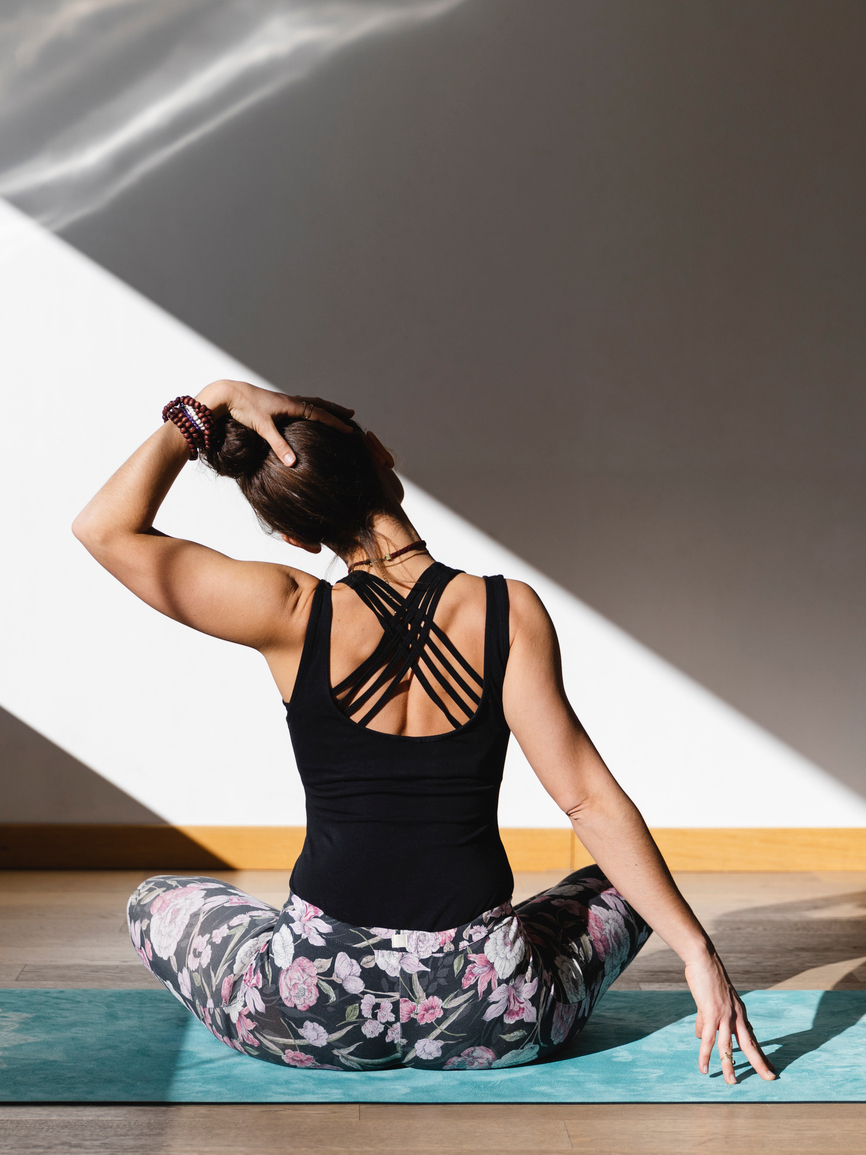
Here's another neck stretch because with all the time we spend looking at our phones throughout the day, our necks might be feeling it. Coleman says this is a great stretch to do if you struggle with rounded shoulders. And Perry adds that it can relieve tightness in the neck and upper trapezius muscles.
Perry shares how to do it:
1. Sit or stand, maintaining an upright and comfortable position.
2. While your face remains forward, put your right hand to the top of your head or your left ear.
3. Gently rest your right ear on your right shoulder.
4. Hold for 30 seconds.
5. Switch positions and repeat.
6. Supine Twist
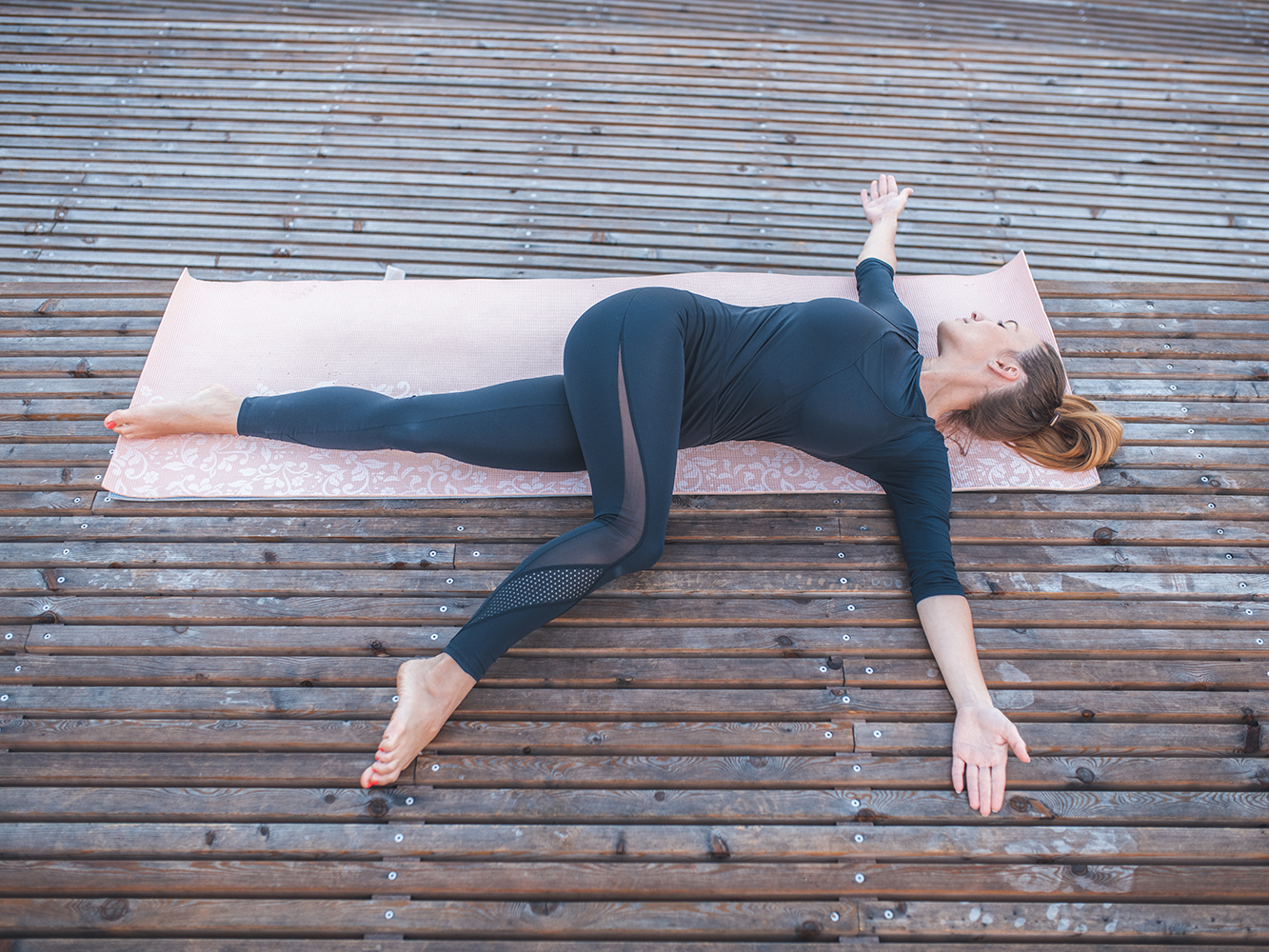
Perry says the supine twist helps to relax your body by stretching your back, glutes, and hip muscles.
Mah shares how to do it:
1. Lie on your back, and draw your right knee into your chest, left leg long.
2. Interlace 10 fingers around your right shin and pull the leg.
3. Take a breath in. Then exhale and draw the right knee to the left side and extend your right arm out to the side in line with your shoulder. Keep both shoulders grounded as you twist.
4. For a deeper stretch, you can turn your nose toward your right hand.
5. Switch to the other side.
7. Side Stretch
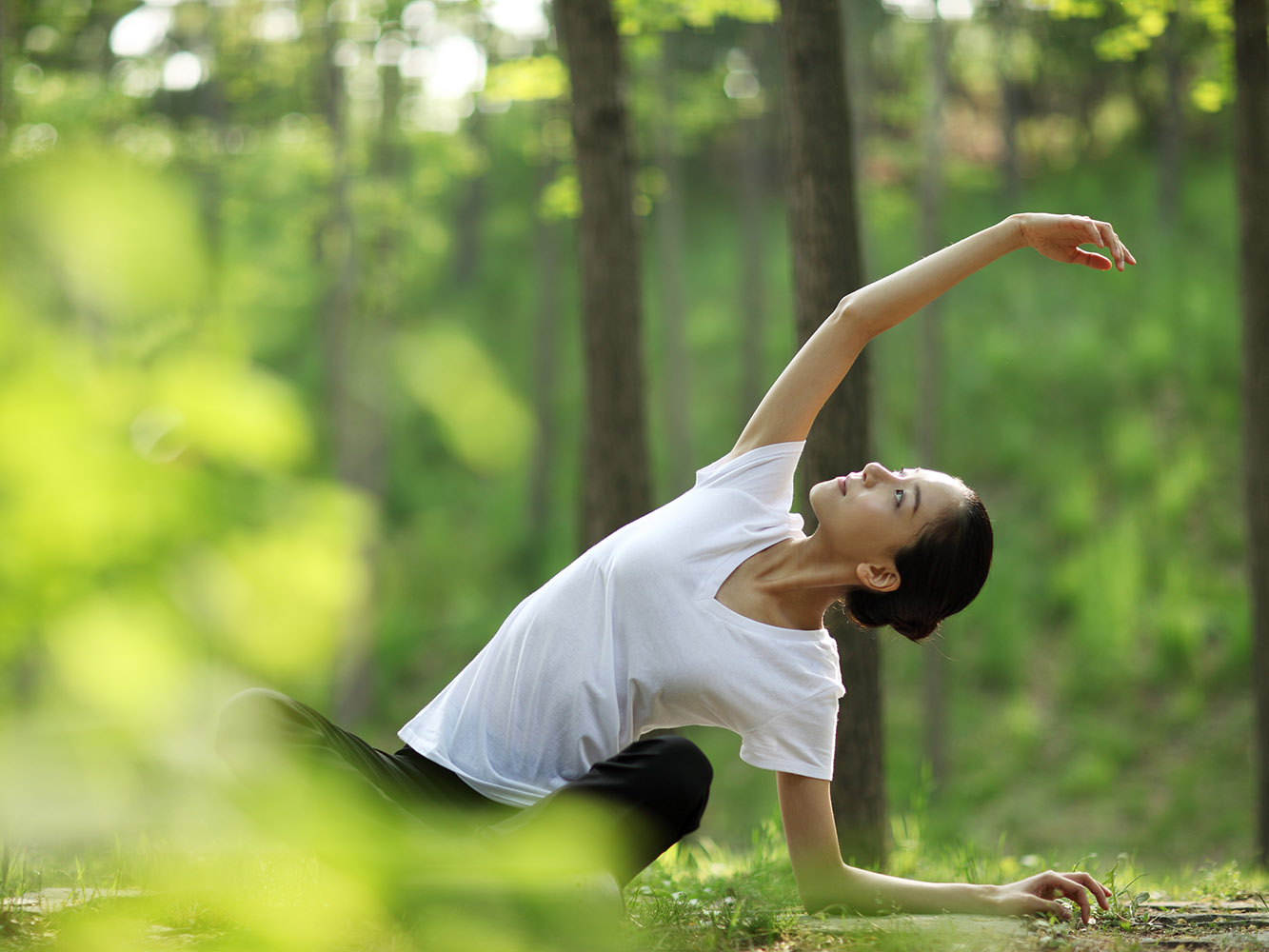
This can feel so good since it elongates the sides of your body.
Mah shares how to do it:
1. Sit in a comfortable position on the floor with your legs crossed.
2. Gently reach your right arm up. Then bend over to the left, elongating the right side of your body.
3. Deepen into the stretch and breathe in and out.
4. Repeat on the other side.
8. Butterfly Pose
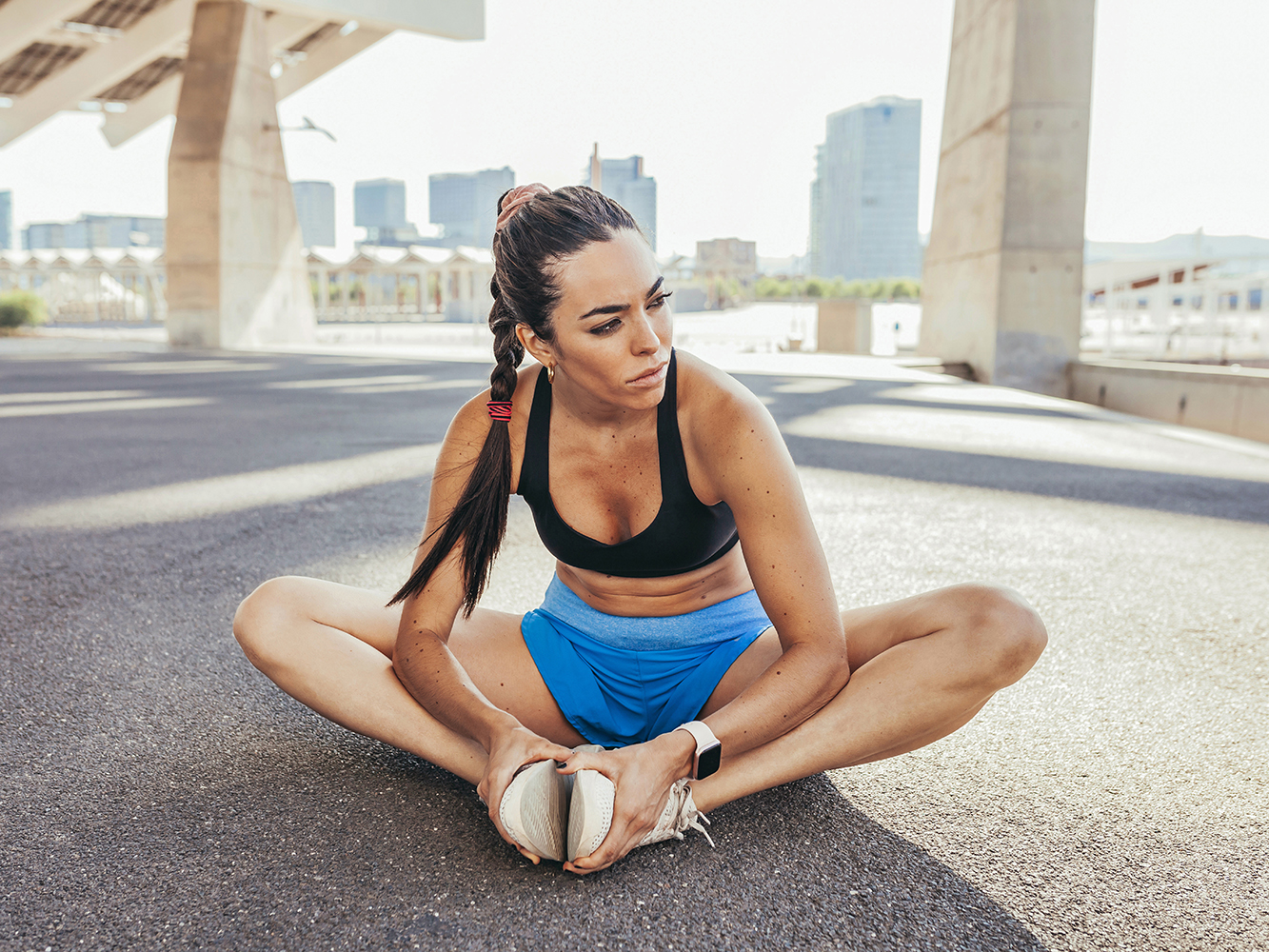
Perry says the butterfly pose helps to open up the lower back, thighs, and hips.
Perry shares how to do it:
1. Sit on the bed or floor with your heels together, knees wide, and hands resting on your feet.
2. Brace the core, exhale, and gently lower your torso toward the middle of your thighs.
3. Try to lengthen through your spine, and press your elbows against your inner knees to open your hips further.
4. Hold for at least 30 seconds.
9. Piriformis Stretch
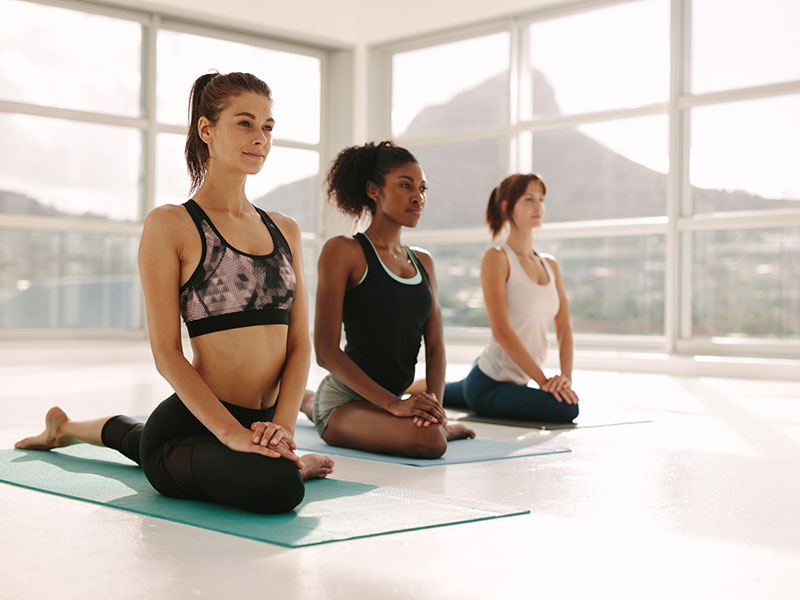
Martinez says this is identical to the pigeon pose in yoga.
Martinez shares how to do it:
1. Bring your right leg forward, placing your shin parallel to your hips. The left leg is back and in a straight position.
2. Lean your torso over your right leg to feel a stretch deep within the glutes, where the piriformis is located.
3. Repeat on the other side.
10. Seated Pec Stretch
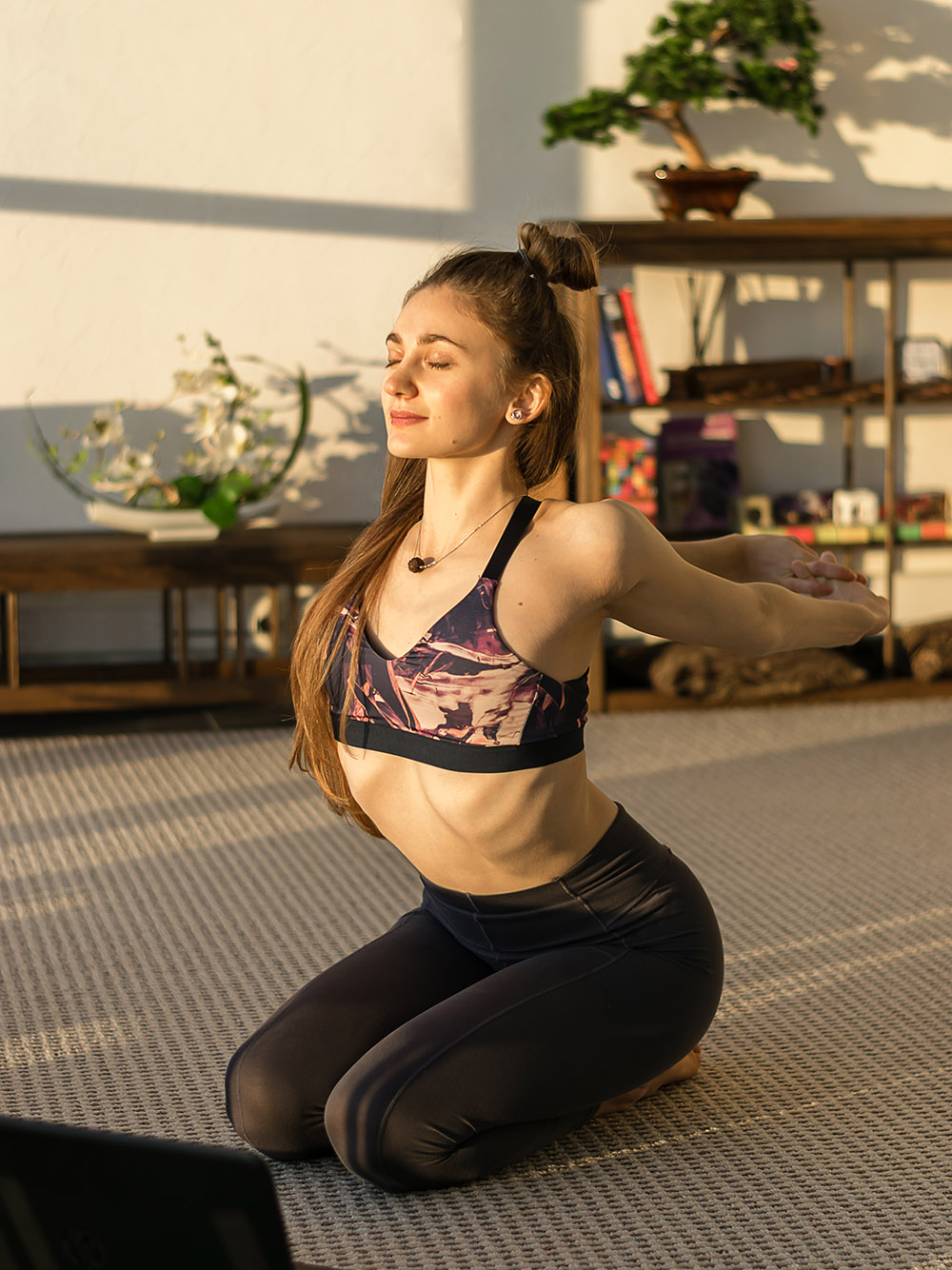
This will help stretch your shoulders and chest.
Martinez shares how to do it:
1. While seated (choose your seated position based on personal comfort level), bring your hands behind your head and clasp your fingers.
2. Bring your elbows backward away from the front of your body.
11. Legs Up the Wall
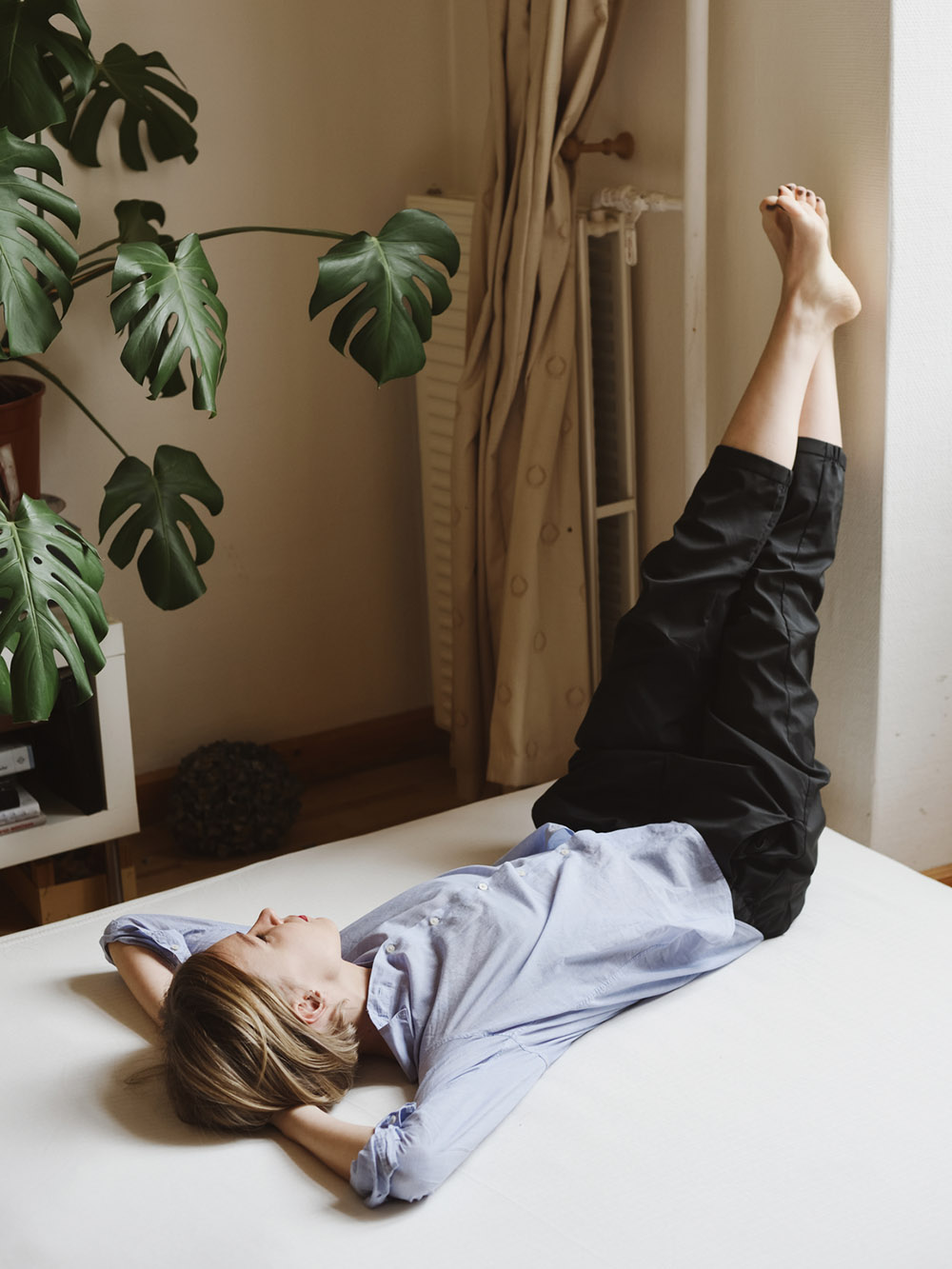
"This is a restorative pose aiming to reduce tension in your back, shoulders, and neck while promoting relaxation," Mah says.
Mah shares how to do it:
1. Lie on your back, and swing your legs up the wall, either directly against it or a few inches away—whatever is most comfortable for you.
2. Hold this position for a few minutes, and feel all the blood from the feet rush down into the body.
12. Kneeling Hip Flexor
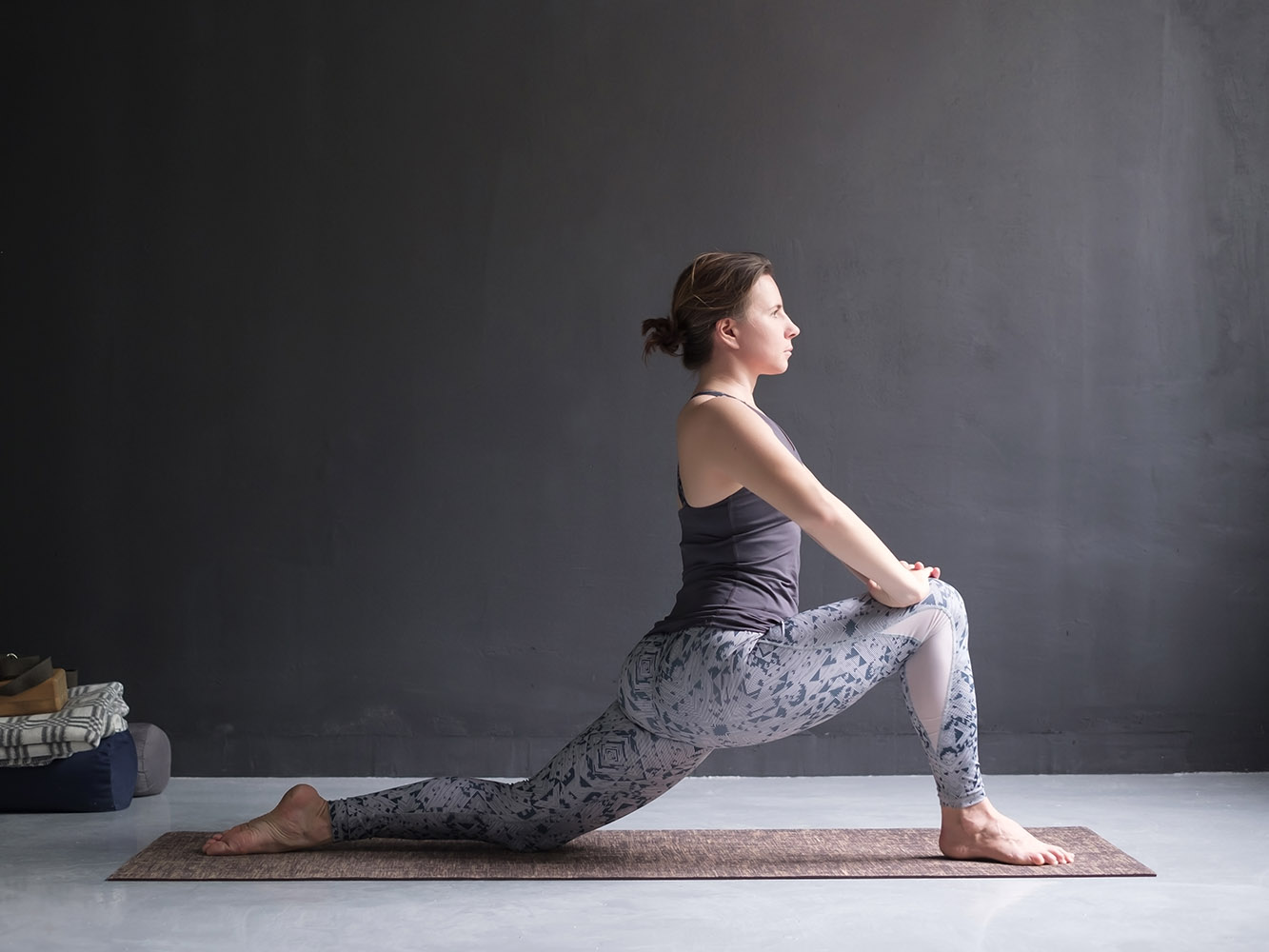
This will alleviate any tightness you may have in the hip area.
Martinez shares how to do it:
1. Start with your left knee planted on the ground; the right leg is bent in a lunge position.
2. Place your hands on your hips and shift your hips forward to feel a stretch on the front of your hips.
3. Repeat on the other side.
13. Standing Back Stretch
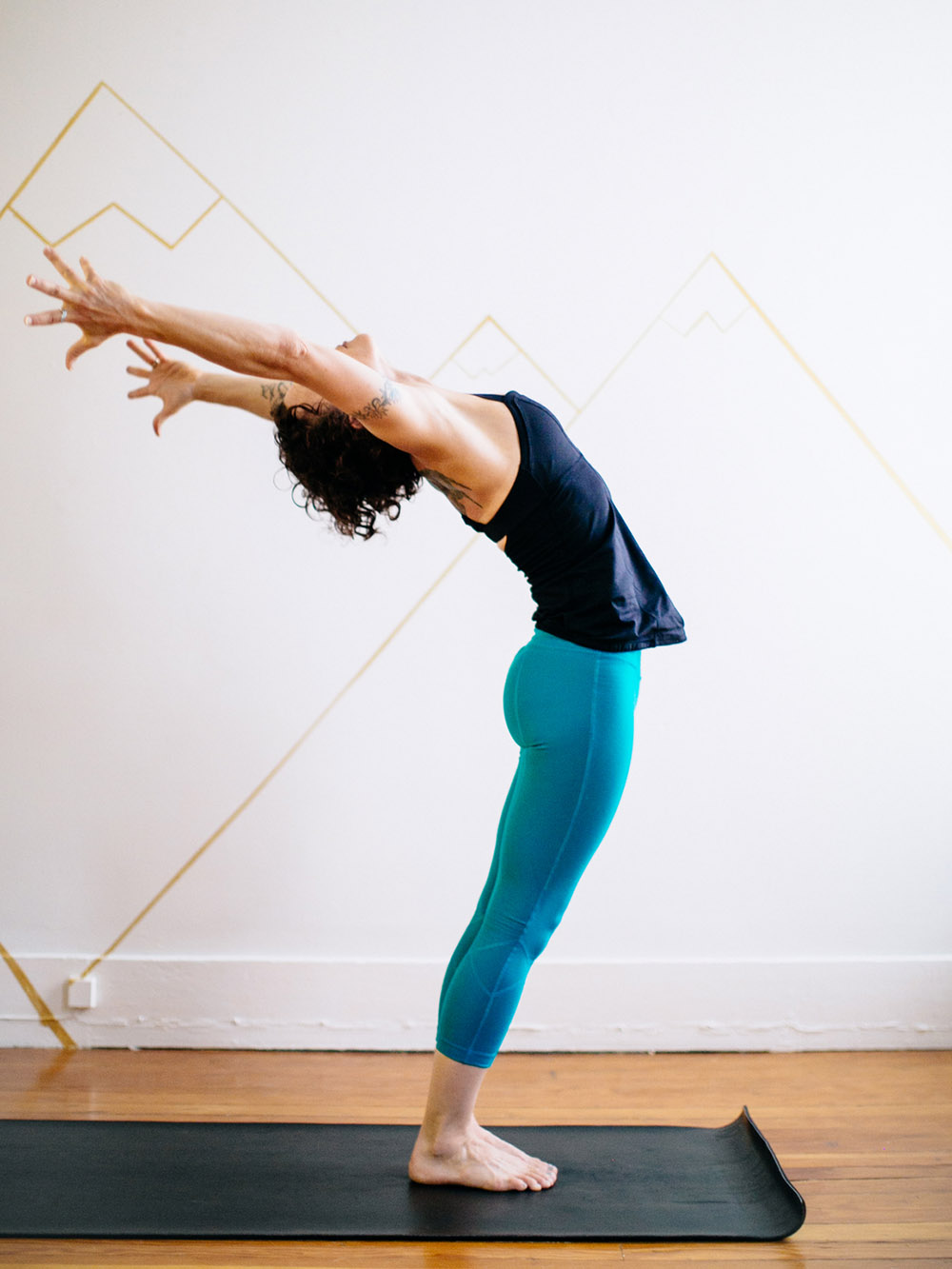
Perry says this stretch helps with relaxing the quads and hip flexors and improves spinal mobility.
Perry shares how to do it:
1. Starting at the center, bring the arms out, about hip-width.
2. With your arms up, inhale, and lean gently into a backbend, reaching up into the fingertips as you open your front body.
3. On the exhale, bring yourself back to center.
14. Bent Leg Forward Fold
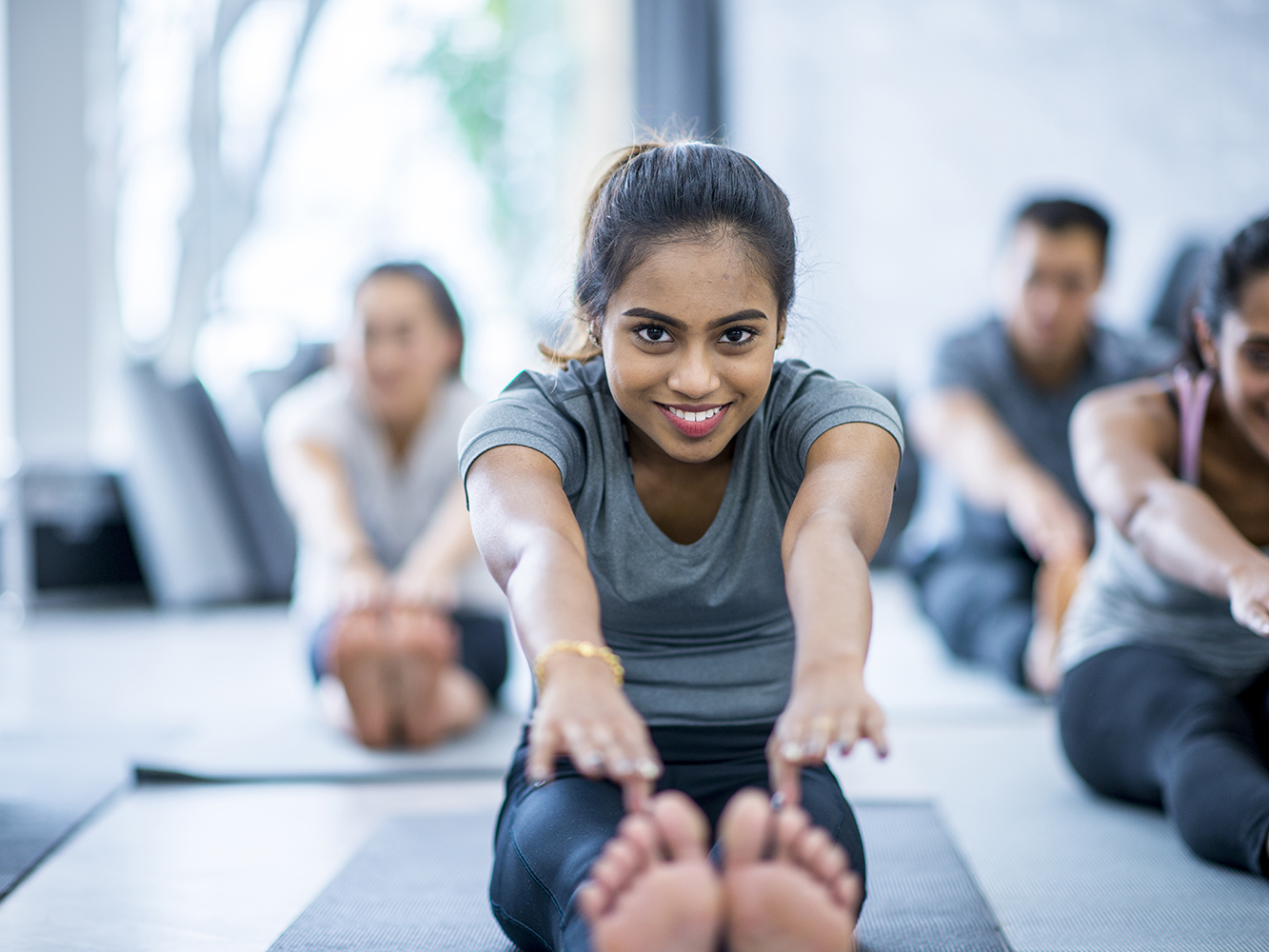
Mah says that forward folds really help release stress.
Mah shares how to do it:
1. Stretch out both legs in front of you. Inhale and reach both arms up to the sky. Then exhale and hinge from your hips, folding over your legs.
2. Grab the feet and bend your knees a lot, keeping your spine straight.
3. Breathe deeply into your stomach to go from the sympathetic to the parasympathetic nervous system.
15. Standing Calf Stretch
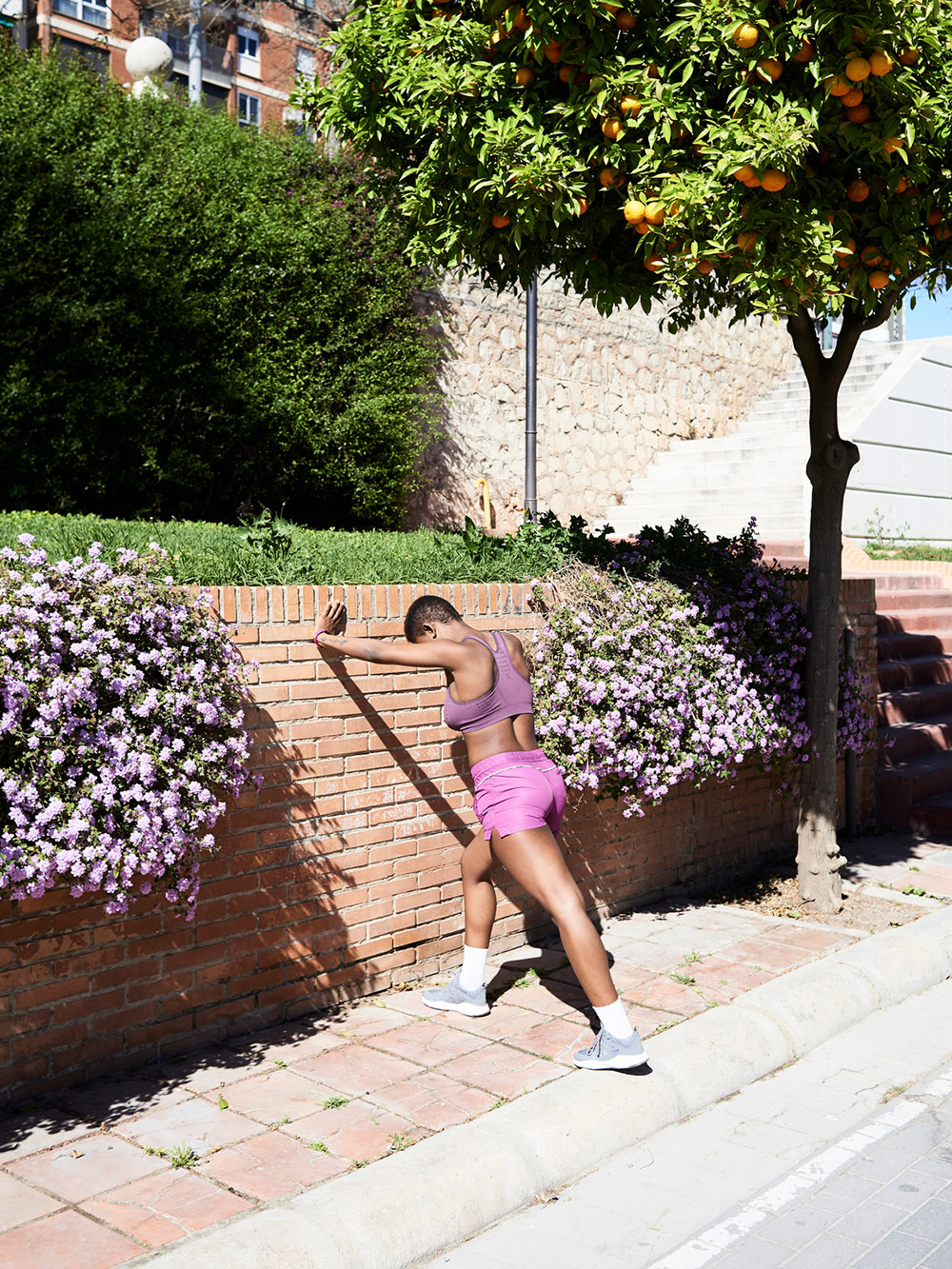
This is great for your calves and ankles.
Coleman shares how to do it:
1. Face a wall, and place your hands on it for support.
2. Once your hands are on the wall, step one foot slightly back on the ball of the foot with the leg straight, toes parallel, and then gently lower your heel down to the floor.
3. Hold and breathe for around 30 seconds.
4. Repeat two to three times per side.
Next, 10 Things That Can Mess With Your Sleep—and What to Do About It
This article was originally published at an earlier date and has since been updated.
Disclaimer
This article is provided for informational purposes only and is not intended to be used in the place of advice of your physician or other medical professionals. You should always consult with your doctor or healthcare provider first with any health-related questions.
Sarah is lifestyle writer and editor with over 10 years of experience covering health and wellness, interior design, food, beauty, and tech. Born and raised in Los Angeles, she attended New York University and lived in New York for 12 years before returning to L.A. in 2019. In addition to her work at Who What Wear, she held editor roles at Apartment Therapy, Real Simple, House Beautiful, Elle Decor, and The Bump (sister site of The Knot). She has a passion for health and wellness, but she especially loves writing about mental health. Her self-care routine consists of five things: a good workout, “me” time on the regular, an intriguing book/podcast/playlist to unwind after a long day, naps, and decorating her home.
-
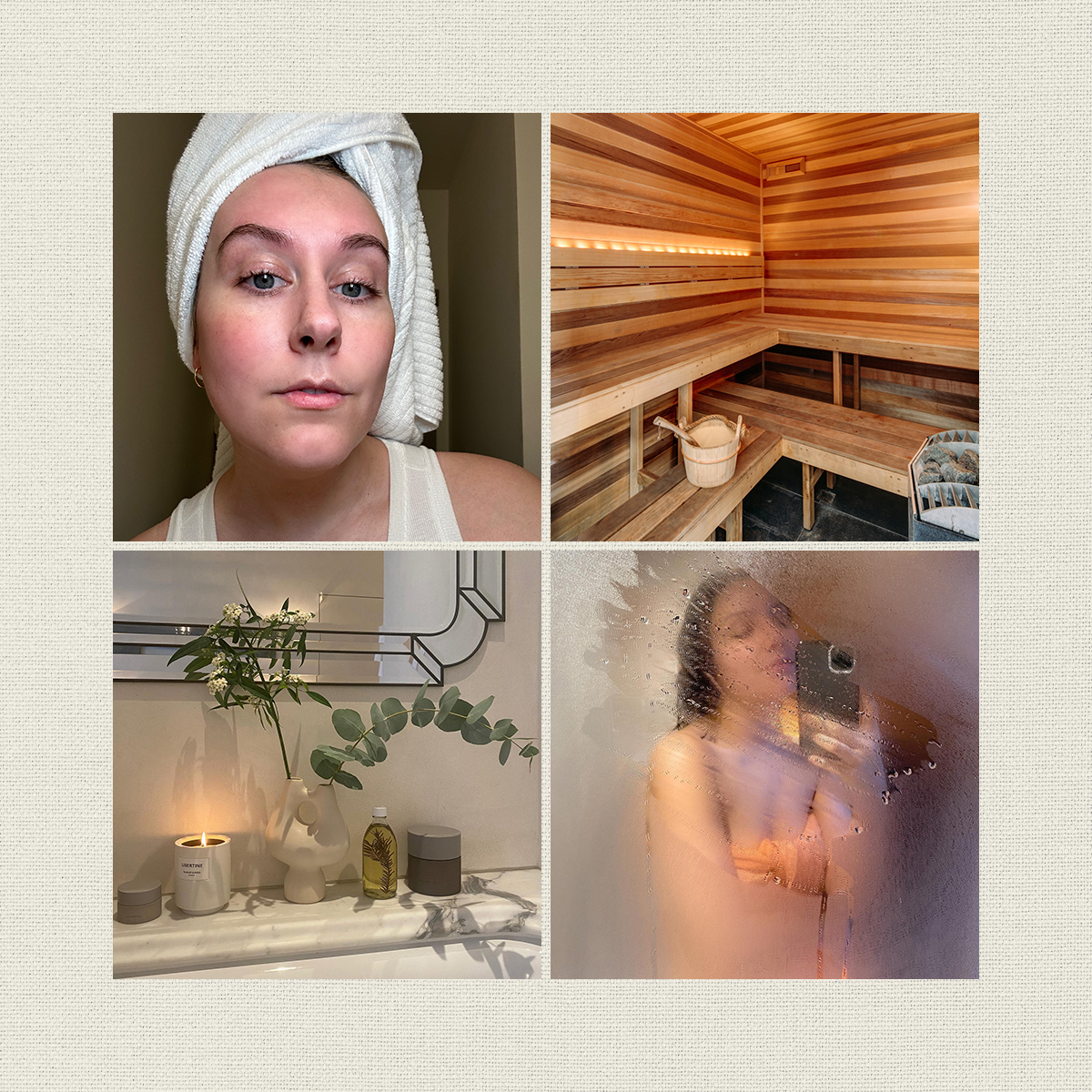 I Tried the Internet-Famous Sauna–Cold Plunge Combo—It Eliminated Skin, Sleep, and Stress Issues
I Tried the Internet-Famous Sauna–Cold Plunge Combo—It Eliminated Skin, Sleep, and Stress IssuesHere's my unfiltered experience.
By Kaitlyn McLintock
-
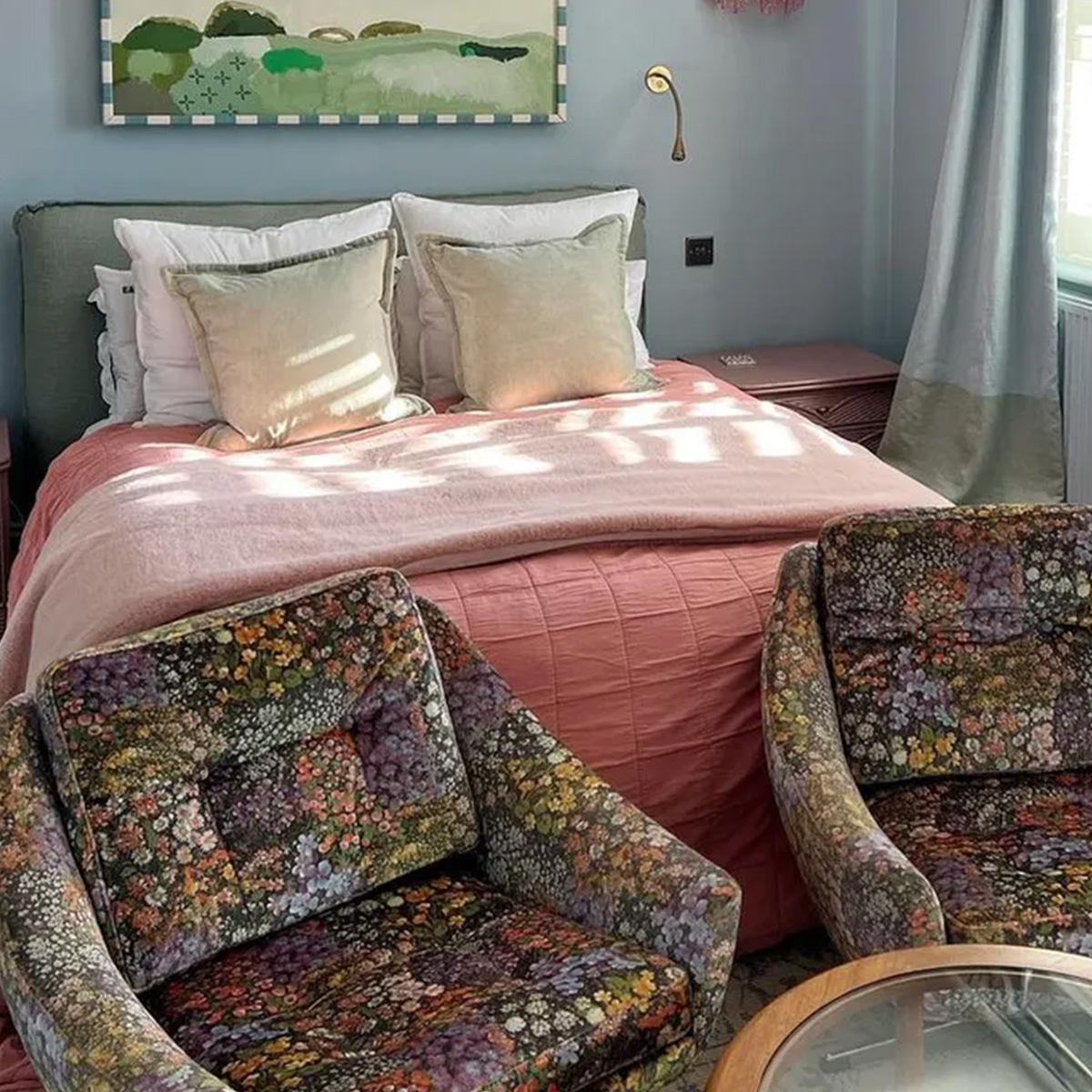 The Most Well-Rested Fashion People Say These Are the Absolute Best Mattresses (and They're on Sale)
The Most Well-Rested Fashion People Say These Are the Absolute Best Mattresses (and They're on Sale)Sleepy girl summer.
By Ana Escalante
-
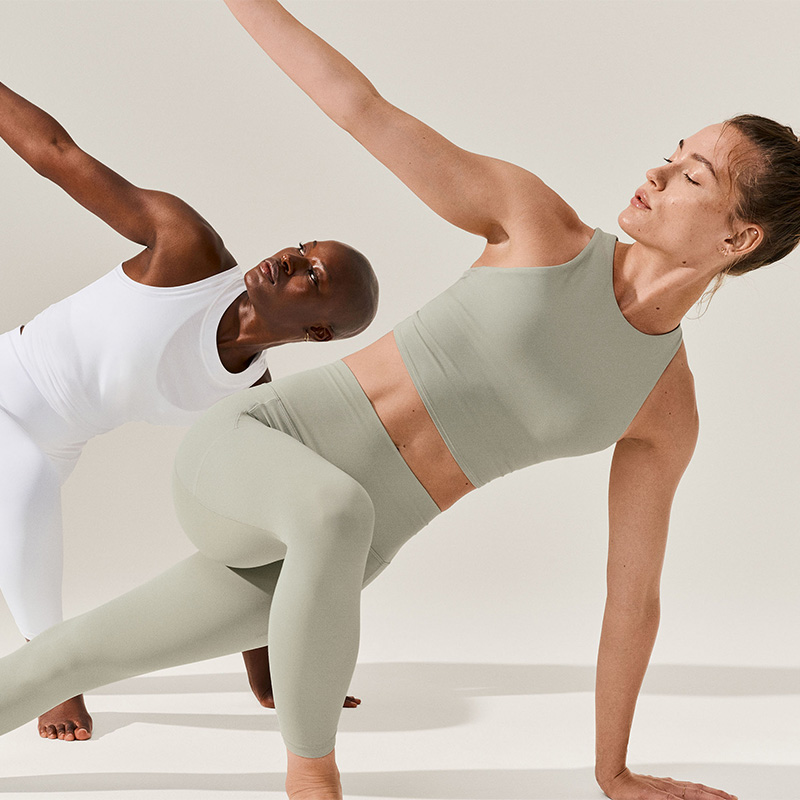 I Live for Yoga and Pilates—These Are the Pieces That Help My Flow
I Live for Yoga and Pilates—These Are the Pieces That Help My FlowTake notes.
By Humaa Hussain
-
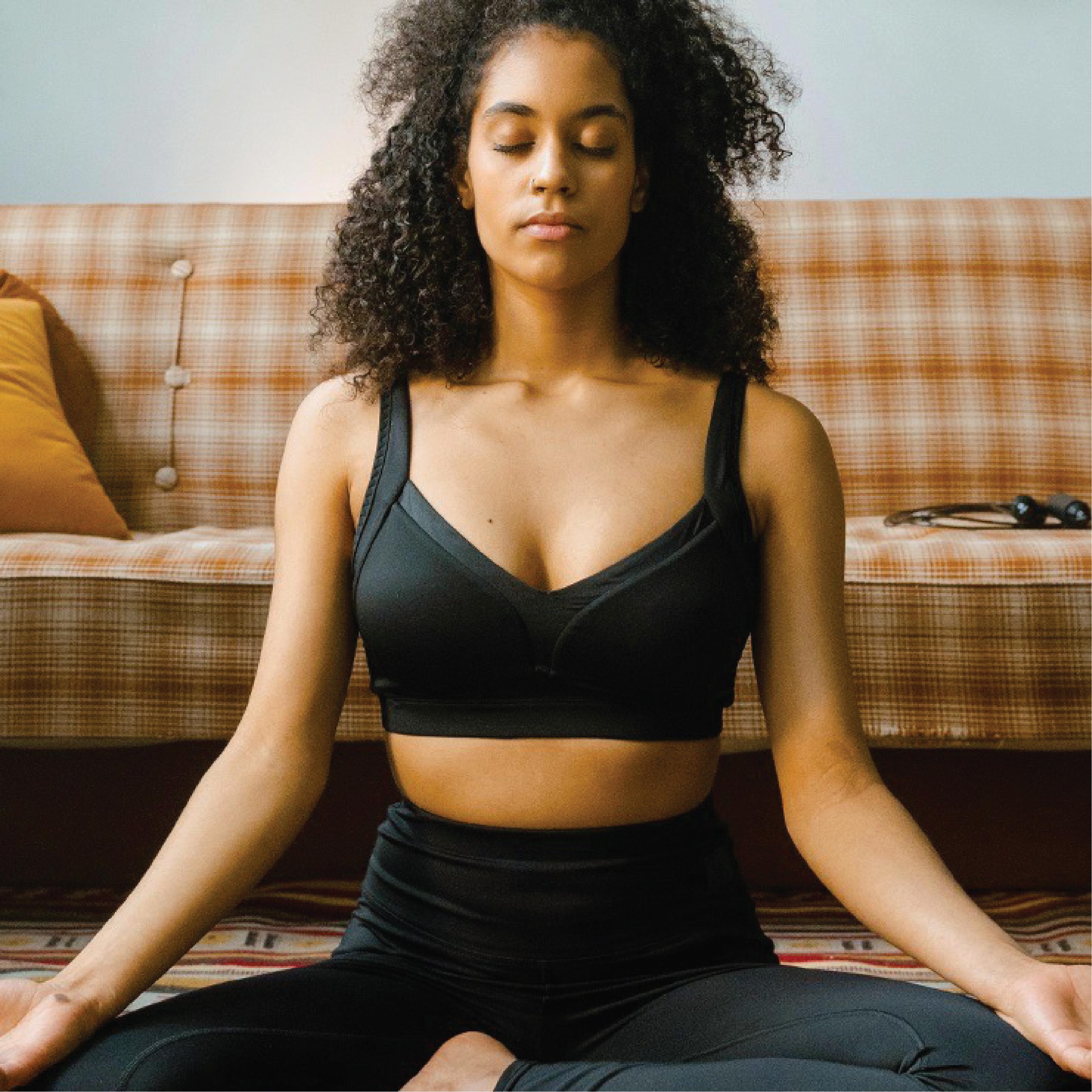 It's Time to Get Our Nutrition in Check for Summer—This App Is Making It Easy
It's Time to Get Our Nutrition in Check for Summer—This App Is Making It EasyThe recipe ideas are endless.
By Who What Wear
-
 If You're Battling With Digestive Issues, This Could Be Why
If You're Battling With Digestive Issues, This Could Be WhyTurns out, you may not have IBS after all.
By Kia Topps
-
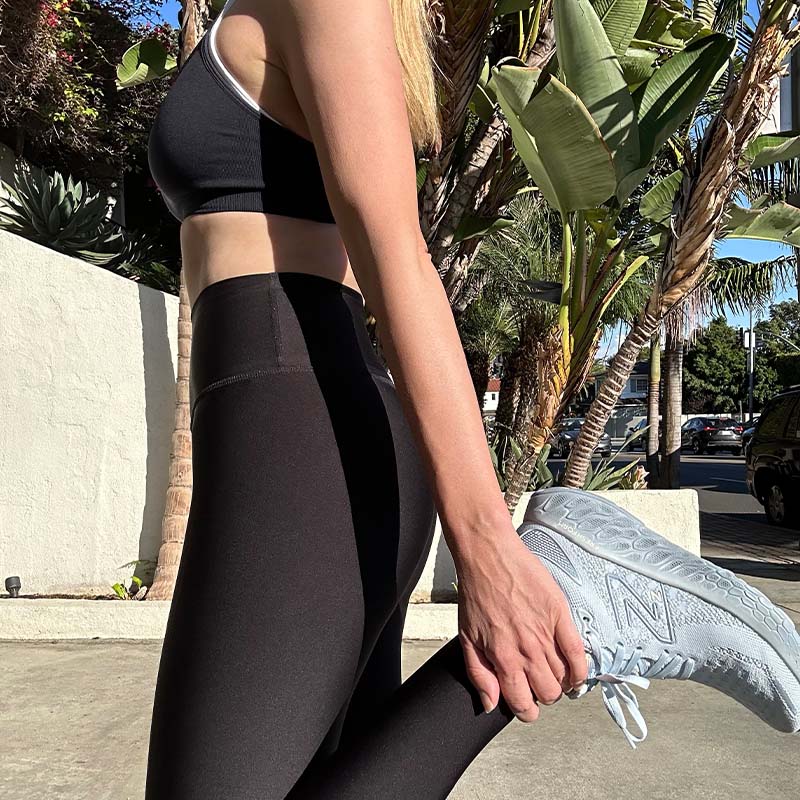 Our Editors Own a Lot of Sneakers, But This Pair Comes in First Place Every Time
Our Editors Own a Lot of Sneakers, But This Pair Comes in First Place Every TimeA major win.
By Aniyah Morinia
-
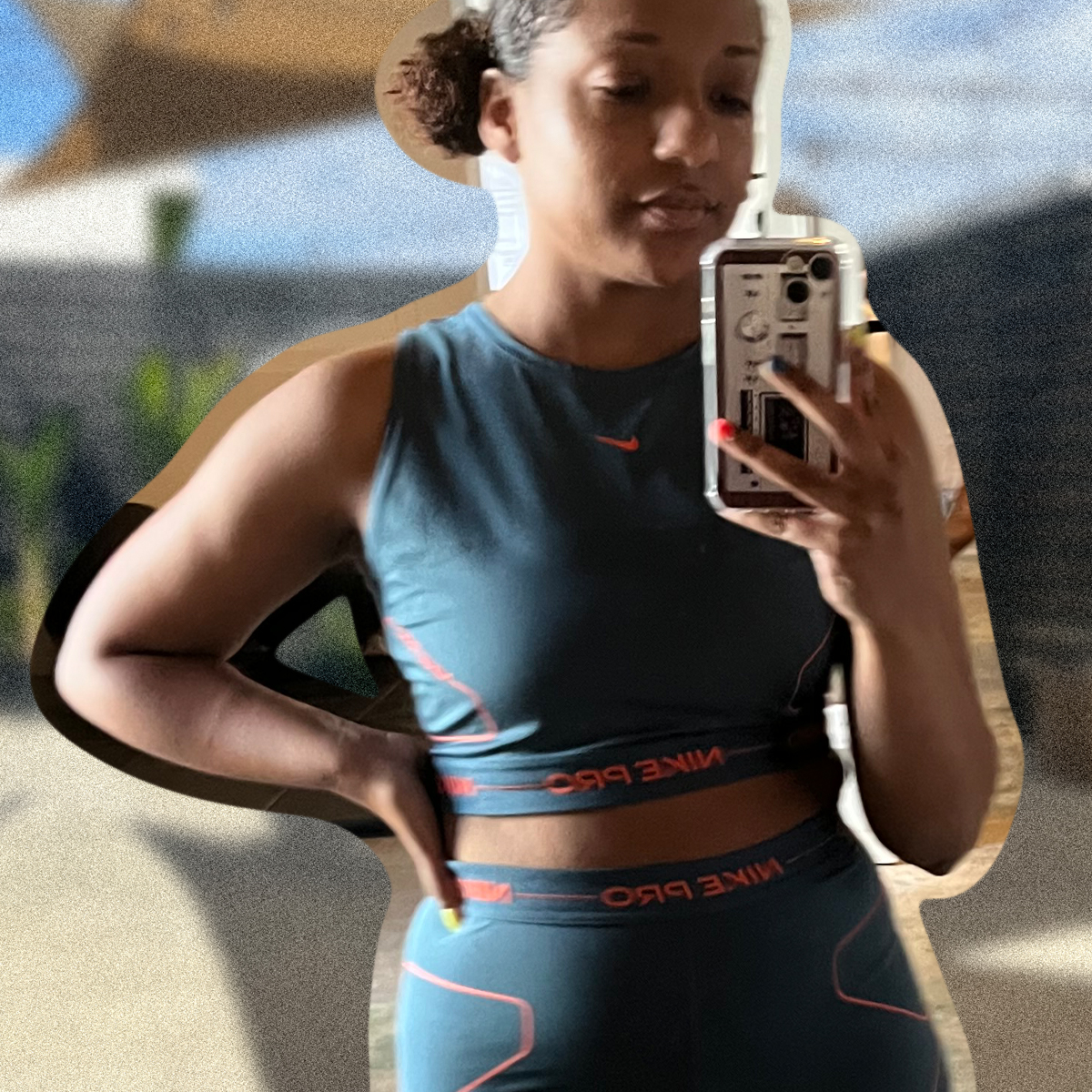 I Changed My Mind About Strength Training When I Tried This Workout
I Changed My Mind About Strength Training When I Tried This WorkoutMy confidence is officially on 10.
By Kia Topps
-
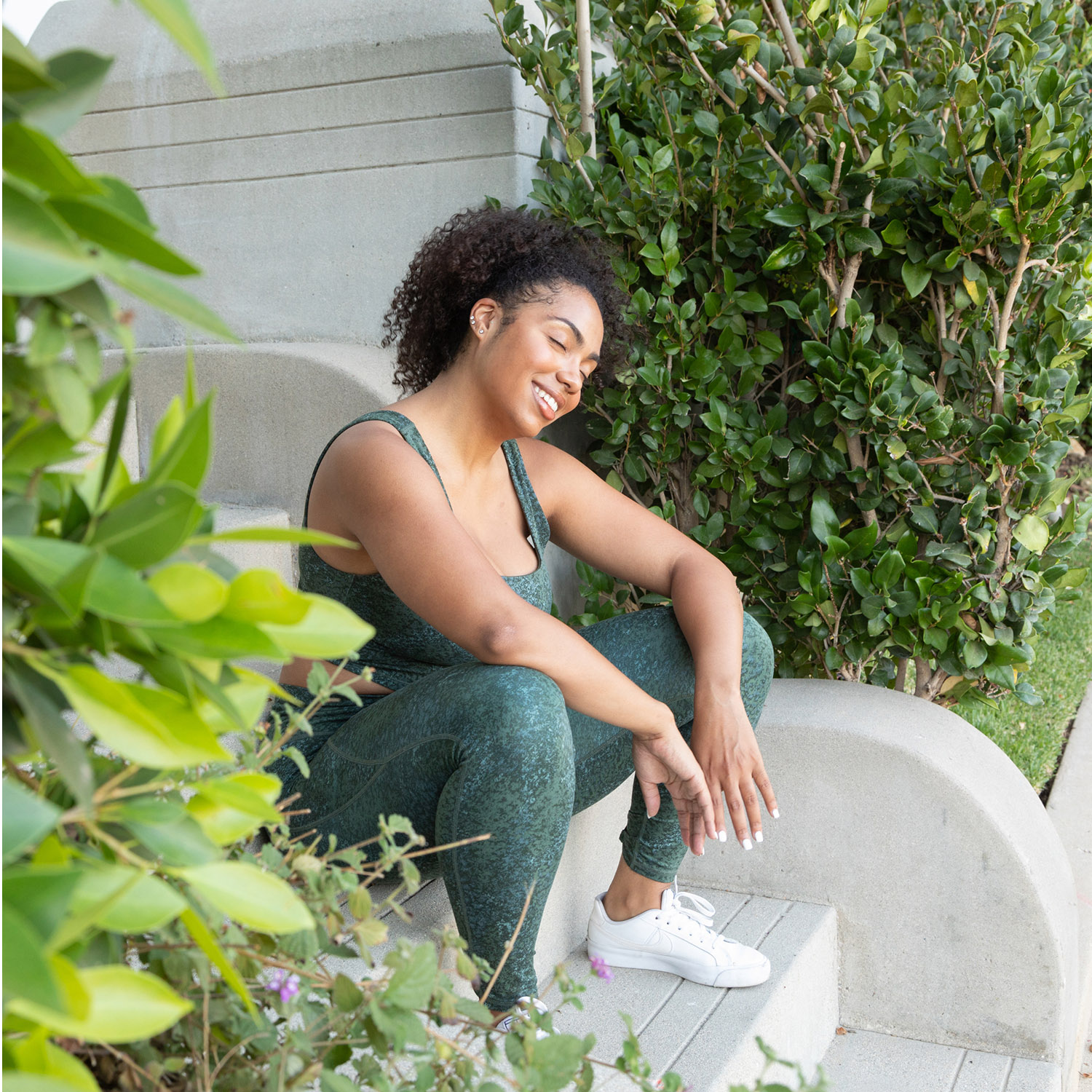 This Type of Gear Will Take Your Workout to the Next Level
This Type of Gear Will Take Your Workout to the Next LevelBring it on.
By Sarah Yang
